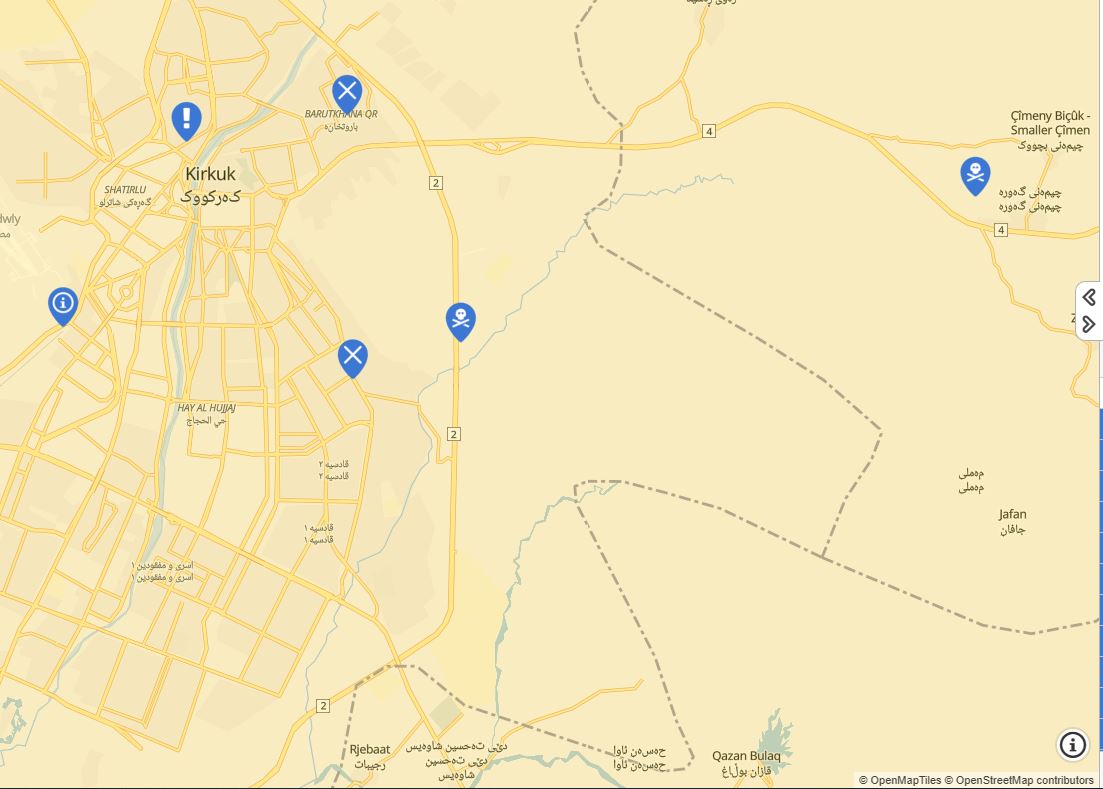1.3K
A weekly brief of events and news occurred in the disputed territories.
Kirkuk
- On January 16, Kurdish journalist Hardi Mohammed was released on bail after appearing before the Kirkuk Court of Investigation on a complaint filed by the National Security Agency. Mohammed said he was “surprised” that the lawsuit accused him of trying to cause “ethnic and religious disruption,” defending himself by declaring that he is reporting the “issues of the people.” Mohammed said that after his media report about a Kurdish employee dying while in police custody, several lawsuits have been prepared against him. “As far as I know, more than five Kurdish journalists in Kirkuk have been charged with such complaints in different and influential media outlets,” added Mohammed.
- On January 15, residents of the Barutkhana neighborhood demonstrated against a municipal decision to demolish 400 houses. The protesters revealed that the municipality has plans to build a new road crossing the community without consideration or compensation for homeowners. The neighborhood is a low-income Kurdish area mainly populated by those who returned from displacement in 2003. Separately, Dilan Ghafour, a Kurdish lawmaker, criticized the Iraqi Ministry of Labour and Social Affairs for conducting a survey only for Hawija district to identify low-income families and include them in the social protection network. “The fact that the study conducted by the Ministry does not include other districts is illegal and completely unacceptable. The survey must consist of the districts of Dibis, Daquq, and other areas.” The mentioned districts have a Kurdish-majority population which Baghdad’s survey has excluded.
- On January 16, the Iraqi Army deployed forces again in Kurdish neighborhoods, including Panja Ali and Kurdistan, to conduct house searches. The phenomenon of raiding Kurdish homes has become a daily behavior of the Iraqi Army, which has annoyed Kurdish residents, and prompted many to leave the city. The Kurdish parties repeatedly appealed to the government to stop the harassment and criticized the operation as a sign of military rule because they were not court-ordered. Since October 16, 2017, martial law has been imposed on Kurds in Kirkuk province. On January 14, Iraqi General Abdul Amir Rashid Yaralla, Deputy Commander of Joint Operations, and a delegation from the Ministry of Defense, arrived in Kirkuk. According to a statement issued by the Iraqi Army Chief of Staff, the delegation’s visit is to discuss the latest preparations for handing over the city’s security files to the local Police. Ending military rule was a condition put forth by several Sunni and Kurdish parties to the new Iraqi government.
- On January 17, a police officer and his driver were ambushed by ISIS (Da’esh) fighters near Jabal Bor in Kirkuk. The officer, a lieutenant named Nawzad Hassan, was visiting military checkpoints near the locality. According to security officials, the terrorists gunned down Hassan and his driver Mohammed Pasha, resulting in their immediate deaths. A day after the incident, Da’esh claimed responsibility. The incident took place half a mile from the beltway, which raised concerns about terrorist attacks reaching the city. On January 17, military intelligence seized 3,086 pounds of ammonium nitrate in the Hawija district.
- On January 16, a gang involved in the drug trade wounded two police officers in an ambush near Chiman village. The Police set up an ambush after receiving information about the drug dealers’ activity in the city, but gang members opened fire on Police, wounding two officers and fleeing the scene. Since October 17, 2017, Kirkuk has become a main hub for drugs trafficked from Iran.
- The Kirkuk Integrity Commission released a statement announcing a six-year prison sentence by the court against the former director of planning at Kirkuk’s governorate, Saddam Hussein. According to the statement, the sentence was carried out in absentia due to the escape of the culprit. The Integrity Commission revealed that Hussein was involved in corruption in the renovation project of the new provincial building and the Riyadh Veterinary construction. According to the court order, all the accused’s property has been seized, and he is banned from traveling abroad. Talabani was able to flee outside Iraq before the court ruling.
Khanaqin
- According to the statistics of the Social Welfare Network of Diyala province, Khanaqin has the highest rate of poverty in the province. According to the survey, 11,000 poor families have been identified in Khanaqin, which showed more poor people in Khanaqin compared to other areas of Diyala province. It is also noted that the province identified 63,000 impoverished, including 11,000 in Khanaqin.
Tuz Khurmatu
- On January 15, two shepherds from Qalan village were kidnapped between Tuz Khurmatu and Kifri. Witnesses accused Da’esh terrorists of the abduction. The terrorist organization has depended on ransom to generate income for attacks.
- On January 13, an explosion occurred in the Koromor gas field in the Qadir Karam district without damage. At the beginning of the incident, security agencies reported that a missile hit the gas field, causing property damage. However, they later said a “technical” issue caused the exposition. Ahmad Mufti, deputy minister of natural resources, told the media that the cause and nature of the explosion are still unknown and that the security forces have launched an investigation. In the past, Iranian-backed militias launched several attacks on the gas fields.
Shingal (Sinjar)
- On January 19, the German parliament recognized the Yazidi Genocide in Iraq after holding a special session. The resolution stated that the Bundestag “recognizes the crimes against the Yazidi community as genocide, following the legal evaluations of investigators from the United Nations.”

